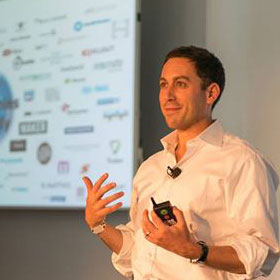Every few weeks the digital media industry lights up with another late stage funding announcement. Fab recently raised $40MM, Pinterest raised $27MM, Klout raised $30MM, Joyent raised $85MM, and DropBox raised $250MM. This is just a small subset of the activity from my news feed last quarter.
These mega-rounds are a new trend in the VC business. It is particularly good for early stage investors because companies don’t need to go public to find growth capital anymore.
The untold story is the effect these rounds have in the marketplace. The companies that receive growth financing often cement their position as market leaders. Not only do they have an additional $50MM on the balance sheet, but they also get more press and have an easier time hiring senior employees after the financing. This means that late stage investors are becoming king-makers in the market. This rite of passage is not well-understood by many early stage companies.
To explain this phenomenon you have to start with the secondary markets. Over the last few years SecondMarket and SharesPost have emerged as a major source of liquidity for VC funds. The criteria for getting listed on SecondMarket is a valuation over $100MM and recognition that you are either the #1 or #2 company in your sector. Not surprisingly, growth funds have adopted the same criteria for their investment thesis.
The final step for many growth companies is to go public. Not all of them will make it, but the ones that do (Groupon, Jive, BrightCove, BazaarVoice, etc) are undisputed leaders in their fields. This means that growth equity investors have to look at the business through the lens of a public market analyst.
Companies that want to raise a growth financing must first make the case that they can be good public companies. This is a major challenge. For starters, they have to prove operating leverage before they are profitable. They also need a business model that passes muster with public market analysts. To give you an example from the adtech market, there are very few publicly traded “advertising intermediaries”. Most companies either sell direct to an advertiser (aka agencies and software companies) or they own media (aka publishers). This is why Specific Media purchased MySpace. It is also why DoubleClick purchased DART and built a software business. The only public ad network today is ValueClick, and a significant portion of their analyst cred comes from the recurring revenues they acquired with Commission Junction.
One outcome of the growth equity process is that newer markets can be easier to fundraise for than established markets. For example, one of my companies, Extreme Reach, has an existing public comparable called Digital Generation (Nasdaq: DGIT). DGIT trades below book value because Extreme Reach has taken 100 of their clients over the last year. Nonetheless this was a big hurdle to overcome in the minds of growth stage investors. The same is not true for more speculative markets like Tumblr and FourSquare, which have the potential of becoming the next Facebook.
The final hurdle is that companies must demonstrate that they are the best company in their sector. This is the most subjective part of the process. At Buddy Media, this conversation hinged on the number of enterprise clients and the team. At Huffington Post, it was about traffic growth and unique users. At Pinterest, I assume it is because they have the most traffic of any visual search/discovery company. In this case building PR and brand value is very important.
For early stage companies, raising a growth round is not the end-all-be-all, but it is a new phenomenon and will likely continue to influence our business over the next decade. Getting the right early stage investors in place, with the right terms and conditions, can help you make this transition down the road successfully.

Ian Sigalow
http://sigalow.comIan is a co-founder and partner at Greycroft Partners in New York City. He has been a venture capitalist since 2001.

AUTHOR adamdevine
Posted on 12:05 pm March 1, 2012.
This makes me wonder if, given the steadily lowering barrier to laymen investing in private companies, we’re heading towards a future where startups will have their own public offering market: with sufficient transparency, a startup that sells bronzed banana peels would find starry-eyed investors who think it’s a big idea. I guess this is kind of called Kickstarter.com.
AUTHOR idsigs
Posted on 12:32 pm March 1, 2012.
@adamdevine “With sufficient transparency” is the key phrase. Every market is susceptible to fraud. My fear is that it will get regulated so that it doesn’t work anymore (kind of like the public market post Enron).